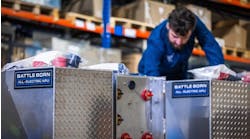Developing the technology needed to meet '07 emissions rules and improving truck security are the two major challenges facing the industry in the near future, according to Skip Yeakel, the new chairman of the Truck Manufacturers Assn. and director of government and industry relations for Volvo Trucks North America.
Yeakel acknowledged in an interview with FLEET OWNER that the magnitude of change on the horizon from the '07 emissions rules and truck security needs is daunting from the manufacturing perspective. “Cooperative research” may be the only way to find realistic solutions to those issues, he said.
“It takes years of engineering work to integrate new emission-compliant engines into trucks,” he explains. “It took three years of work for us at Volvo to develop engines to meet the '02 rules. Realistically, we need five years to handle the scope of the '07 regulations. At this point, we only have fours years left.”
Yeakel believes manufacturers need to do some soul searching in terms of their approach to the '07 rules. “The approach we took as an industry to the '02 rules was anything but elegant — some fought the rules and some complied. We can't go through that again,” he said.
“We need to investigate the prospects of non-competitive research to make meeting the '07 rules as easy as possible. That's where our best chances are.”
Cooperation is also of the utmost importance in terms of handling the new security demands placed on trucks in the wake of Sept. 11. “We really need to forge alliances with the government to preclude our products from becoming weapons of mass destruction,” he said. “We need to do this for the good of our country as well as the good of our industry.”
Yeakel thinks current industry-government research initiatives, such as the Truck of the 21st Century project spearheaded by the Dept. of Energy, provide a good road map to follow.
“If we could get all of the government agencies together on one project with us — EPA, Dept. of Homeland Security and Dept. of Transportation — we could design safer trucks that reduce emissions, improve fuel economy, and have better security systems all in one fell swoop,” he said. “We can do a lot more together than we can by ourselves.”


